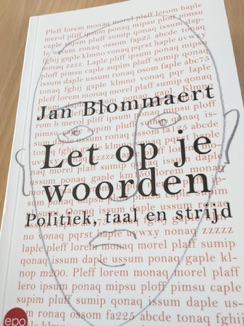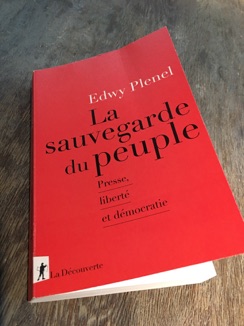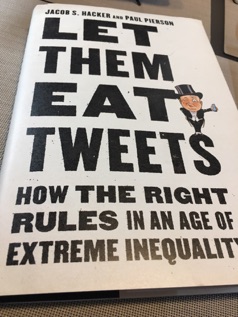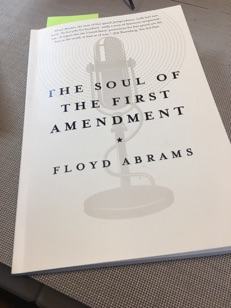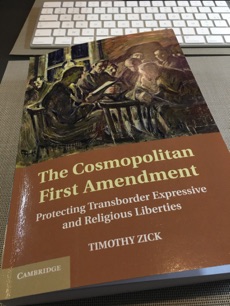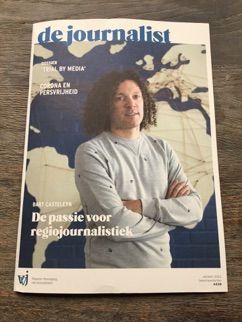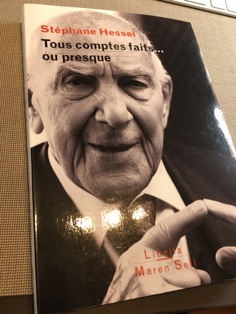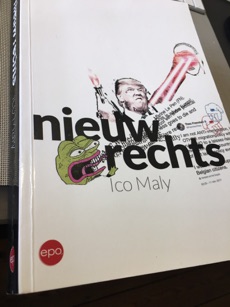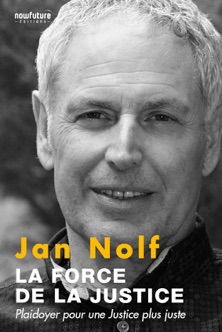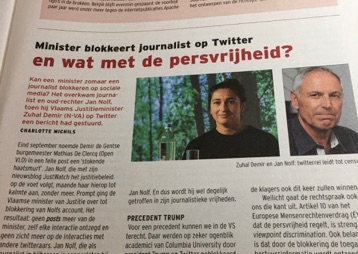QUESTIONING JUSTICE
2020/21

Yesterday, January 13th (and not a ‘Vendredi Treize’) Donald Trump became the first American president to be impeached twice.
On January 8th, he already suffered some kind of social media impeachment: a ‘permanent suspension’ by Twitter.
Tomorrow the @realDonaldTrump will probably lose another battle: his petition at the Supreme Court to review the decision of the U.S. Court of Appeals for the Second Circuit holding that his practice of blocking critics from his Twitter account violates the First Amendment.
Last Friday, January 8th, it was – as mentioned in the tweet of @JameelJaffer, Director of the Knight First Amendment Institute – a “crazy coincidence”, the Supreme Court was considering Trump’s cert petition at the same time Twitter was announcing that it had kicked Trump off its platform.
The Knight First Amendment issued a statement “that Twitter’s decision to permanently block President Trump from its platform effectively moots het Justice Department’s petition for Supreme Court Review”.
From a practical point of view, the Supreme Court was put in a strange situation: as @jordanthelawyer put it: “the Court’s ruling can’t change anything. (If they order him to unblock, he can’t, and even if he could, there’s nothing to see. If they rule that he can continue to block, well, block what?) That’s the definition of moot”.
In European continental law, we’d say Trump lost his (personal, judicial) ‘interest’ in the case.
The task and power of the U.S. Supreme Court is very different from the one we know in the highest courts in Europe (if only for the way the US Supreme Court ‘picks’ cases for review).
The U.S. Supreme Court plays a role that is unknown in Belgium and Europe: its judicial power encompasses what our Belgian Constitutional Court, the Cour de Cassation and the Council of State rule on but also the European Court of Human Rights (ECHR).
‘Precedent’ is not the (Continental) European way of judging, but exceptions exist (for decisions by the Cour de Cassation and the ECHR). And anyway, judgements published in the professional legal press (from any court) carry their weight and offer inspiration – sometimes worldwide.
But I’m not sure the case would be ‘moot’ in Europe. Anyway, it remains to be seen what ‘permanent suspension’ means on Twitter.
First of all, I doubt very much this suspension will be ‘permanent’ , certainly not ‘eternal’. Things can change, and this case remains relevant.
Even our Belgian Prime Minister, Alexander De Croo declared today in Parliament that decision by Twitter “is problematic. Freedom of opinion is a fundamental right. It is not up to the CEO of a private company, who also has a monopoly on the matter, to decide what may or may not appear online. In our country, it is a judge who decides. That's the way it is, and it has to stay that way”.
The prime minister did indicate that it is a challenge to guarantee the 'offline' fundamental rights also online. 'The social and political debate must be given every opportunity for sharp opinions and contradictions.' Prime Minister De Croo referred to the Digital Services Act, which is in the pipeline and should regulate these matters at the European level (source: Knack magazine on line Knack.be).
At the same time, certain rules that apply online must also apply offline, De Croo stressed. 'Calling for violence, hatred or racial hatred, that's not acceptable”.
Of course, we all agree on that and @jack Dorsey referred to this in his tweet “After a clear warning we’d take this action, we made a decision with the best information we had based on threats to physical safety both on and off Twitter (…) We faced an extraordinary and untenable circumstance, forcing us to focus all of our actions on public safety. Offline harm as a result of online speech is demonstrably real, and what drives our policy and enforcement above all”.
It's important the Twitter boss admitted “I feel a ban is a failure of ours ultimately to promote healthy conversation. And a time for us to reflect on our operations and the environment around us (…) And sets a precedent I feel is dangerous: the power an individual or corporation has over a part of the global public conversation”.
Professor @EthanZ Zuckerman, of MIT’s Center for Civic Media emphasized in his opinion on CNN of January 12th (‘The real lesson of Trump’s social media silencing’) “the actions by Twitter and other companies are being falsely labeled censorship. This is untrue: Trump isn't being censored. None of these platforms have an obligation to provide a forum to anyone. They are all private companies with terms of service that users agree to”.
However, professor Zuckerman proposed a much better shift: “a new vision of social media -- as public infrastructure that is built, owned and moderated by communities.
This is how speech works in the offline world. If I say something violent or offensive within a group of friends, that group has to figure out how to respond: do they confront me to make clear that such speech is unacceptable? (…) We need to debate what sort of public speech and behavior we will accept and who we want to be as a society. A society that abandons this responsibility abdicates a key aspect of full citizenship”.
Certainly, people who do not agree with the rules of Twitter can still go to another internet service, but it will limit their attempts to cry out their hate – and rightly so.
The case is far different for tweeps who play it by the rules, but are blocked by politicians. That is at the core of the case of Knight First Amendment v. Donald Trump that – as a result of the permanent Twitter ban – risks not to be reviewed by the Supreme Court.
Jameel Jaffer is confident “the Second Circuit’s decision—and the decisions of the multiple other courts that have since adopted the Second Circuit’s reasoning—will continue to shape the way that other public officials use social media”.
As Katie Fallow Senior Staff Attorney at the Knight First Amendment Institute at Columbia University put it in her press statement: “The core holding of Knight Institute v. Trump is that public officials who use their social media accounts as extensions of their offices cannot constitutionally block people from those accounts on the basis of viewpoint. This holding protects dissent, ensures that public officials aren’t insulated from the views of their constituents, and prevents digital forums that are increasingly important to our democracy from becoming echo chambers.”
The next procedure seemed already in the pipeline, as Chicago mayor Lori Lightfoot received on December 4th 2020 a letter from the Knight Amendment Institute asking her to unblock Mr. Gregory Mantell, an independent journalist who covers Chicago for his news service. “I take seriously my First Amendment right, even obligation, to engage with the mayor about public matters that affect my audience in Chicago.”
This quote on the press statement of December 4th by the Knight First Amendment Institute, could be copy pasted in my case v. the (regional) Flemish minister of Justice, Zuhal Demir, who blocked me on September 28th 2020:
“Mr. Mantell was blocked from the mayor’s Facebook page on or around September 20, 2020. In response to a media press conference posted to the page, Mr. Mantell posted a comment with a link to a video he produced concerning rising crime rates in Chicago in the page’s comment section. He was subsequently blocked, and his comment was removed from the page. The letter also notes that in response to an Illinois Freedom of Information Act request filed by Mr. Mantell, the mayor’s office provided records indicating that Mayor Lightfoot or her staff have blocked 12 other individuals from the mayor’s page.”
That letter did not remain without result. On December 21st the Chicago mayor unblocked the journalist.
This is exactly what the Flemish Union of Journalists is asking from the Flemish minister of Justice in my case.
Professor Ico Maly of Antwerp University points in Belgium to the politicians of the Flemish nationalist and separatist party N-VA “Bart De Wever, Zuhal Demir and Theo Francken (who) are fighting a real battle against the mainstream media (and, by extension, all social actors who do not follow their line in an indulgent manner). Scoops are reserved for entertainment programs or willing media such as Newsmonkey (*), and of course for their own social media. (…) this AltRight movement “reflects the hope to build a different modernity, based on organic groups, private rights and a digitally powered antidemocracy” (my translation of ‘Nieuw Rechts’ The New Right, EPO Editions 2018, p. 249).
Meanwhile, Belgium – or rather the Flanders region - was listed again on the map of the European Centre for Press & Media Freedom & ECPMF with my case (link here).
Let’s wait for another day in Washington, but as the saying goes: ‘When it rains in Paris, it drizzles in Brussels.’
You can say now: ‘When it rains in Washington, it drizzles in Brussels.’
To read my story, and the case of Guillaume Tatu v. the president of the French national assembly, Richard Ferrand, check my Law Blog on this topic here and…
Tomorrow is another day...
(*) UPDATE 15 01 2021: in his column in De Standaard of January 13, 2021, historian and senior writer Marc Reynebeau remarked that the new magazine Newsweek Belgium (no stranger to Newsmonkey) was commissioned by the Flemish Parliament - whose president Liesbeth Homans of N-VA has been In blocking me on Twitter for years - to produce a special edition as a “publicity leaflet” for 90,000 euros on the occasion of the celebration of 50 years of the Flemish Parliament. In that publication a gallery of honor of 14 “emancipating” Flemings is mentioned, but of these, 2 are notorious Nazi sympathizers and collaborators with the German occupier, August Borms (convicted and executed in 1946) and Staf De Clercq (deceased in 1942 and also still honored by neo Nazis now)
a ‘crazy coincidence’ on twitter
14 januari 2021
That letter did not remain without result. On December 21st the Chicago mayor unblocked the journalist.
This is exactly what the Flemish Union of Journalists is asking from the Flemish minister of Justice in my case.
